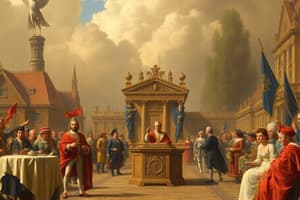Podcast
Questions and Answers
Which of the following best describes the composition of the Third Estate in pre-revolutionary France?
Which of the following best describes the composition of the Third Estate in pre-revolutionary France?
- Nobility and aristocrats
- Clergy and religious figures
- Royal family members
- Peasants and commoners (correct)
The Taille was a land tax that primarily affected the First and Second Estates.
The Taille was a land tax that primarily affected the First and Second Estates.
False (B)
What was the main purpose of convening the Estates General in 1789 by King Louis XVI?
What was the main purpose of convening the Estates General in 1789 by King Louis XVI?
To address the economic crisis in France
The period of extreme violence during the French Revolution, instigated by the Jacobins, is known as the ______.
The period of extreme violence during the French Revolution, instigated by the Jacobins, is known as the ______.
What were the main guiding principles that became central to France's national identity after the monarchy was abolished?
What were the main guiding principles that became central to France's national identity after the monarchy was abolished?
Match these events or groups with their description:
Match these events or groups with their description:
How did the social structure in pre-revolutionary France contribute to the people's dissatisfaction?
How did the social structure in pre-revolutionary France contribute to the people's dissatisfaction?
What impact did the French Revolution have on the rest of the world?
What impact did the French Revolution have on the rest of the world?
Flashcards
Three Estates
Three Estates
The three social groups in pre-revolutionary France: clergy, nobility, and commoners.
Taille
Taille
A land tax in France that burdened the common people.
Estates General
Estates General
A representative assembly in France including the three estates, convened in 1789.
Reign of Terror
Reign of Terror
Signup and view all the flashcards
Execution of King Louis XVI
Execution of King Louis XVI
Signup and view all the flashcards
Social Inequality
Social Inequality
Signup and view all the flashcards
Liberty, Equality, Fraternity
Liberty, Equality, Fraternity
Signup and view all the flashcards
Rise of Napoleon Bonaparte
Rise of Napoleon Bonaparte
Signup and view all the flashcards
Study Notes
The French Revolution: Causes, Events, and Consequences
- The French Revolution was a period of major political and social change in France.
- Society was divided into three estates:
- First Estate: Clergy (Church members)
- Second Estate: Nobility
- Third Estate: Peasants and commoners (vast majority)
- The Third Estate faced heavy taxation (like the Taille, a land tax).
- Dissatisfaction and demands for reform grew among the common people.
- The Estates General was a representative body called by King Louis XVI in 1789 to address the economic crisis.
- Estates General members represented the different Estates.
Causes of the French Revolution
- Bad Harvests and Rising Prices: Poor harvests led to food shortages and increased bread prices, causing hardship for many people.
- Desire for Social Change: The Third Estate demanded equality and an end to the privileges of the nobility and clergy.
Events of the French Revolution
- Execution of King Louis XVI: King Louis XVI was executed in January 1793 for treason.
- Reign of Terror: The Jacobins, a radical group, seized power and established a violent period known as the Reign of Terror, punishing those who opposed the Revolution.
Living Conditions Before the Revolution
- Inequality existed between the estates.
- Nobility and clergy had privileges, like tax exemptions.
- Common people faced financial burdens and social inequality.
Consequences of the French Revolution
- Rise of Napoleon Bonaparte
- End of French monarchy
- Establishment of new principles: liberty, equality, and fraternity.
- Reshaped the political and social landscape of France and inspired movements for change globally.
Studying That Suits You
Use AI to generate personalized quizzes and flashcards to suit your learning preferences.




